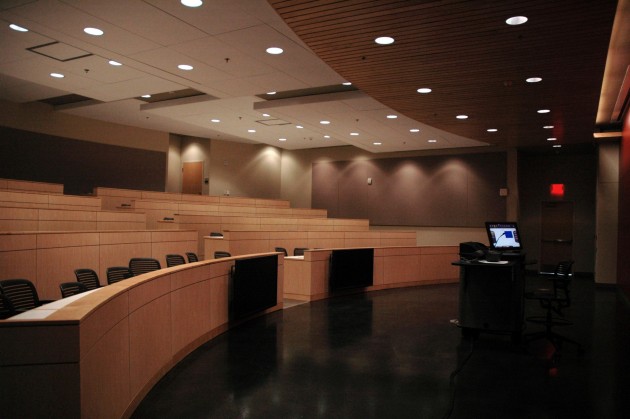
The College of Health and Human Sciences opened their new building for classes this fall after beginning construction in 2009.
The new Health and Human Sciences, or HHS, building is the first building constructed on Western Carolina University’s West Campus as a part of the Millennial Initiative, an economic development strategy started in 2005 for the creation of partnerships within the private sector.
The 160,000-square-feet building cost a total of $46.2 million. The building is located 1.5 miles away from campus and will have limited student parking. Two Cat Tran shuttles will service West Campus, and plans are in the works to begin construction on a sidewalk in the fall.
Classes at the West Campus will be staggered 30 minutes after classes on main campus start, allowing for at least 45 minutes travel time for MWF classes and 75 minutes for T/TR classes. The final exam schedule for West Campus will also be staggered to allow time for those traveling from one campus to the next.
The HHS building itself is four stories and features a combination of brick and large glass panes overlooking the mountains. The top of the first floor is home to a spacious roof garden and walkway. The new building will also include student lounges, student collaboration rooms, an atrium, a Java City and two areas laden with tables and couches for studying.
The building will feature a 175-person seated conference room with the ability to turn into a 300-person seated banquet room and service from the nutrition and dietetics kitchen. It will have about 13 classrooms, some of which equipped with cameras for broadcast purposes. Lockers lining the halls are available for student use.
One of the many features of the new HHS building is the hydrotherapy pool donated by MedWest-Harris, complete with a wheel chair lift. The building also houses a primary care clinic with pediatric care. An adaptive living space is also included so that stroke victims can get an idea of how to live independently.
Various labs have also been set up in the new building. For example, the Communication Sciences and Disorders program will hold free hearing checks to the public along with two specially constructed testing rooms. The emergency management program has emergency simulation labs. The environmental health program hosts a study of indigenous mosquitos.
For more information, visit a list of Frequently Asked Questions at http://www.wcu.edu/2215.asp.






